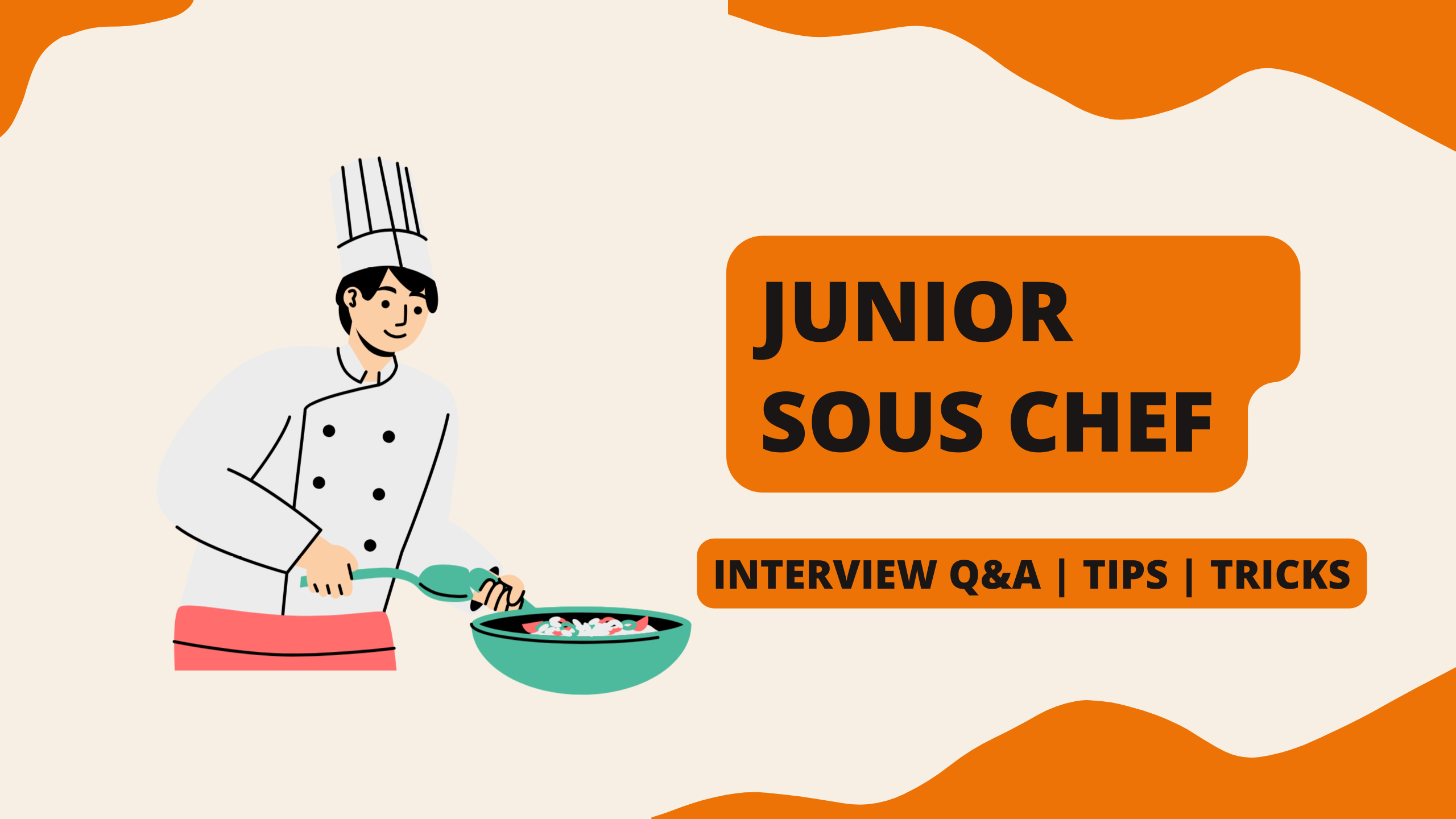Blog Detail

Tips to Prepare for Junior Sous Chef Interview in Canada
May 3, 2024
Tips to Prepare for Junior Sous Chef Interview in Canada
In the dynamic and diverse culinary landscape of Canada, aspiring chefs often find themselves vying for positions that offer not only professional growth but also opportunities for creative expression. Among the myriad roles available in the culinary industry, the position of a Junior Sous Chef holds particular significance. This blog aims to provide a comprehensive guide to navigating the Junior Sous Chef interview process in Canada, shedding light on the skills, expectations, and preparation required to excel in this role.
Understanding the Role of a Junior Sous Chef
Before delving into the intricacies of the interview process, it is essential to grasp the responsibilities and expectations associated with the role of a Junior Sous Chef. In a professional kitchen hierarchy, the Junior Sous Chef occupies a pivotal position, serving as a bridge between the executive chef and the line cooks. Their duties typically encompass supervising kitchen staff, assisting in menu development, ensuring quality and consistency in food preparation, and maintaining kitchen sanitation standards.
Key Skills and Qualifications
Successful candidates for the position of Junior Sous Chef possess a diverse skill set and a blend of culinary expertise, leadership qualities, and organizational acumen. Some of the key skills and qualifications sought by employers include:
1. Culinary Proficiency: A deep understanding of culinary techniques, food safety protocols, and proficiency in various cooking methods are essential prerequisites for the role.
2. Leadership and Team Management: Junior Sous Chefs are expected to lead by example, fostering a collaborative work environment, and effectively delegating tasks to kitchen staff.
3. Adaptability and Creativity: The ability to adapt to changing menus, dietary restrictions, and culinary trends, while infusing creativity into dishes, sets exceptional candidates apart.
4. Communication Skills: Clear and concise communication is integral to coordinating kitchen operations, liaising with suppliers, and conveying instructions to kitchen staff.
5. Time Management: Junior Sous Chefs must possess excellent time management skills to ensure efficient workflow, timely preparation of dishes, and adherence to service schedules.
Preparing for the Interview
A successful interview for the position of Junior Sous Chef requires thorough preparation and a strategic approach. Here are some essential tips to help candidates prepare effectively:
1. Research the Establishment: Familiarize yourself with the restaurant or culinary establishment where you are interviewing. Understand its cuisine, ambiance, target clientele, and any unique selling points.
2. Review the Menu: Study the establishment's menu offerings to gain insights into its culinary style, ingredient sourcing, and signature dishes. Be prepared to discuss your ideas for enhancing the menu or introducing seasonal specials.
3. Practice Technical Skills: Brush up on your culinary techniques and practice preparing a variety of dishes, including those commonly featured on the menu. Demonstrating your proficiency during the interview can leave a lasting impression on the hiring manager.
4. Anticipate Interview Questions: Prepare responses to common interview questions related to your culinary background, leadership experience, approach to teamwork, and problem-solving abilities. Be ready to provide specific examples that highlight your capabilities and achievements.
5. Dress and Presentation: Dress professionally for the interview, reflecting the standards of the culinary industry. Maintain a polished appearance and exude confidence during the interview process.
The Interview Process
The Junior Sous Chef interview process typically comprises multiple stages, each designed to assess different facets of the candidate's suitability for the role. While the specific format may vary depending on the establishment and hiring practices, common components of the interview process include:
1. Initial Screening: The initial stage may involve a phone or video interview conducted by the hiring manager or human resources representative. This phase often focuses on assessing the candidate's qualifications, experience, and alignment with the organization's values.
2. In-Person Interview: Shortlisted candidates are invited for an in-person interview, where they may meet with the executive chef, sous chefs, and other key personnel. This stage provides an opportunity for the candidate to showcase their culinary skills, discuss their approach to kitchen management, and articulate their vision for the role.
3. Culinary Assessment: Some establishments may incorporate a culinary assessment or practical cooking demonstration as part of the interview process. Candidates may be asked to prepare a specific dish or showcase their creativity by improvising with given ingredients.
4. Behavioural Interview: Behavioural interview questions are commonly used to evaluate the candidate's past experiences, problem-solving abilities, and interpersonal skills. Candidates may be asked to describe challenging situations they've encountered in previous roles and how they successfully resolved them.
5. Cultural Fit Assessment: Employers also assess the candidate's cultural fit within the culinary team and the broader organizational environment. This involves evaluating alignment with the establishment's values, work ethic, and potential for collaboration and growth.
Crafting a Standout Junior Sous Chef Resume for Interview Success
In the competitive culinary industry, a standout resume is essential for landing coveted positions such as Junior Sous Chef. Your resume serves as a snapshot of your culinary expertise, leadership skills, and professional accomplishments. Crafting a compelling resume tailored to the specific requirements of the role can significantly enhance your chances of securing an interview. Here's a detailed guide on how to create a standout Junior Sous Chef resume that highlights your qualifications and impresses potential employers.
1. Contact Information:
· Ensure your contact information, including your full name, phone number, email address, and professional social media profiles (if applicable), is prominently displayed at the top of the resume.
2. Professional Summary:
· Start with a brief professional summary that encapsulates your culinary background, relevant experience, and key strengths. Highlight your passion for food, commitment to excellence, and your ability to thrive in fast-paced kitchen environments.
3. Culinary Experience:
· Detail your culinary experience in reverse chronological order, starting with your most recent position.
· Include the name and location of the establishments where you've worked, along with your job title and dates of employment.
· Provide a concise overview of your responsibilities and achievements in each role, emphasizing your contributions to menu development, kitchen management, and culinary innovation.
· Highlight any promotions, awards, or recognition received for exceptional performance or culinary creativity.
4. Leadership and Team Management:
· Showcase your leadership skills and ability to manage kitchen teams effectively.
· Describe your experience supervising kitchen staff, delegating tasks, and fostering a collaborative work environment.
· Provide examples of successful teamwork, communication strategies, and your approach to resolving conflicts or challenges in the kitchen.
5. Culinary Skills and Expertise:
· Create a dedicated section to highlight your culinary skills, areas of expertise, and proficiency in various cooking techniques.
· Include specific cuisines you specialize in, culinary certifications or training programs completed, and any additional skills such as pastry or butchery expertise.
6. Menu Development and Innovation:
· Discuss your involvement in menu development initiatives, including creating seasonal menus, designing innovative dishes, and incorporating local and seasonal ingredients.
· Highlight any collaborations with executive chefs or culinary teams to conceptualize and execute creative menu offerings.
7. Food Safety and Sanitation:
· Emphasize your commitment to food safety standards and kitchen sanitation practices.
· Mention any certifications or training in food handling, HACCP principles, or ServSafe protocols.
8. Education and Credentials:
· List your educational background, including culinary school or relevant culinary training programs attended.
· Include any professional certifications, affiliations with culinary associations, or continuing education courses related to the culinary arts.
9. References:
· Optionally, provide references from previous employers or culinary professionals who can attest to your skills, work ethic, and character.
· Ensure you have obtained permission from your references before including their contact information on your resume.
10. Formatting and Presentation:
· Keep the layout clean, professional, and easy to read, using a consistent font style and size throughout.
· Use bullet points to list your achievements and responsibilities, making it easier for recruiters to scan your junior sous chef resume.
· Proofread carefully for grammar and spelling errors, ensuring accuracy and attention to detail.
20+ Common Interview Questions for Junior-Sous-Chef and their Answers with Example
Certainly! Here are 25 common interview questions and suggested answers tailored for a Junior Sous Chef position in Canada:
1. Can you tell us about your culinary background and experience?
· Answer: "I have [X years] of experience in the culinary industry, having worked in various kitchens across Canada. My culinary journey began with formal training at [Culinary School], where I developed a strong foundation in classical techniques and culinary arts."
2. What motivated you to pursue a career as a Junior Sous Chef?
· Answer: "I am passionate about creating memorable dining experiences and pushing the boundaries of culinary creativity. The role of a Junior Sous Chef allows me to blend my love for cooking with leadership responsibilities, contributing to the success of the kitchen team and delighting guests with innovative dishes."
3. How do you handle high-pressure situations in a fast-paced kitchen environment?
· Answer: "I thrive in fast-paced environments and understand the importance of remaining calm under pressure. Effective communication, prioritization of tasks, and maintaining a positive attitude are key strategies I employ to navigate challenging situations and ensure smooth kitchen operations."
4. Can you describe your approach to menu development and culinary innovation?
· Answer: "I believe in staying abreast of culinary trends, sourcing seasonal ingredients, and experimenting with diverse flavor profiles to create dynamic and enticing menus. Collaboration with the culinary team, feedback from guests, and a commitment to quality drive my approach to menu development and innovation."
5. How do you ensure consistency and quality in food preparation?
· Answer: "Consistency and quality are paramount in the culinary world. I adhere to standardized recipes, conduct regular taste tests, and provide ongoing training to kitchen staff to uphold our standards. Attention to detail, precise execution, and a passion for excellence are central to maintaining consistency in every dish."
6. What strategies do you use to motivate and inspire your kitchen team?
· Answer: "I believe in leading by example and fostering a collaborative and supportive work environment. Recognizing and acknowledging the contributions of team members, providing constructive feedback, and empowering individuals to showcase their creativity are fundamental to motivating and inspiring the kitchen team."
7. How do you stay updated with culinary trends and industry developments?
· Answer: "I am committed to continuous learning and professional development. I attend culinary workshops, participate in industry events, and actively engage with culinary publications and online platforms to stay informed about emerging trends, techniques, and innovations in the culinary field."
8. Describe a challenging situation you encountered in a previous role and how you resolved it.
· Answer: "In a previous role, we experienced unexpected staff shortages during a busy weekend service. To mitigate the impact on kitchen operations, I quickly reassigned roles, communicated effectively with the team, and prioritized tasks to ensure timely service delivery without compromising quality. This experience reinforced the importance of adaptability and teamwork in overcoming challenges."
9. How do you approach constructive feedback and professional development?
· Answer: "I welcome constructive feedback as an opportunity for growth and improvement. I actively seek input from colleagues and mentors, reflect on areas for development, and strive to incorporate feedback into my culinary practice. Continuous learning and self-improvement are integral to my professional ethos."
10. How do you ensure compliance with food safety standards and sanitation protocols?
· Answer: "I maintain rigorous standards of food safety and sanitation in accordance with industry regulations and best practices. This includes regular temperature monitoring, proper storage techniques, thorough cleaning and sanitizing procedures, and ongoing staff training on food handling and hygiene protocols."
11. Can you discuss your experience with inventory management and cost control?
· Answer: "I have experience in managing inventory levels, optimizing ingredient usage, and implementing cost-saving measures to maximize profitability while minimizing waste. This involves accurate tracking of inventory, strategic purchasing decisions, and collaboration with suppliers to negotiate favorable terms."
12. How do you handle menu modifications for guests with dietary restrictions or allergies?
· Answer: "I approach dietary restrictions and allergies with the utmost attention and care. I communicate effectively with guests to understand their specific needs, modify dishes accordingly, and ensure cross-contamination risks are minimized. Collaboration with the front-of-house team and clear communication with kitchen staff are essential in accommodating guest requirements."
13. Describe a memorable dish you've created and the inspiration behind it.
· Answer: "One memorable dish I created was a [dish name], inspired by [cultural influence/seasonal ingredient]. I wanted to evoke nostalgic flavors while incorporating a modern twist, resulting in a dish that resonated with guests on both a sensory and emotional level."
14. How do you balance creativity with adherence to established recipes and culinary standards?
· Answer: "Balancing creativity with consistency is a delicate yet essential aspect of culinary craftsmanship. While I embrace creativity in dish development, I also recognize the importance of adhering to established recipes and culinary standards to maintain quality and guest satisfaction. Innovation should enhance, rather than compromise, the essence of a dish."
15. Can you discuss your experience with kitchen equipment and technology?
· Answer: "I am proficient in utilizing a wide range of kitchen equipment and culinary technology to optimize efficiency and quality in food preparation. From traditional cooking methods to modern sous-vide techniques and precision cooking equipment, I leverage technology as a tool to elevate culinary experiences and streamline kitchen operations."
16. How do you approach cross-functional collaboration with front-of-house staff?
· Answer: "Cross-functional collaboration is essential in delivering seamless dining experiences. I foster open communication and collaboration with front-of-house staff, sharing insights into menu offerings, accommodating guest preferences, and addressing any challenges or opportunities for improvement that arise during service."
17. What strategies do you employ to maintain a positive kitchen culture and morale?
· Answer: "I believe in cultivating a positive kitchen culture built on mutual respect, camaraderie, and a shared commitment to excellence. Celebrating achievements, promoting a supportive work environment, and providing opportunities for professional growth and development are key strategies in maintaining high morale and team cohesion."
18. How do you approach the integration of sustainable and locally sourced ingredients into menu offerings?
· Answer: "I am passionate about supporting local suppliers and incorporating sustainable practices into culinary operations. I prioritize sourcing seasonal, locally grown ingredients whenever possible, minimizing our environmental footprint and supporting community-based agriculture initiatives."
19. Can you share your experience with training and mentoring junior kitchen staff?
· Answer: "I have a proven track record of training and mentoring junior kitchen staff, providing guidance, and fostering their professional development. I believe in investing in the growth and success of team members, imparting culinary knowledge, and empowering individuals to reach their full potential."
20. How do you adapt to changing culinary trends and guest preferences?
· Answer: "Adaptability is essential in responding to evolving culinary trends and guest preferences. I stay attuned to market trends, gather guest feedback, and collaborate with the culinary team to introduce innovative menu offerings and adapt existing recipes to meet changing tastes and preferences."
21. How do you prioritize tasks and manage time effectively during busy service periods?
· Answer: "Prioritization and time management are essential skills in managing busy service periods. I create daily prep lists, delegate tasks based on urgency and skill level, and maintain clear communication with the kitchen team to ensure efficient workflow and timely preparation of dishes."
22. Can you discuss your experience with international cuisines and multicultural influences?
· Answer: "I have a passion for exploring diverse culinary traditions and incorporating multicultural influences into my cooking. Through travel, research, and experimentation, I have developed proficiency in a wide range of international cuisines, allowing me to infuse global flavors and techniques into menu offerings."
23. How do you handle feedback and criticism from guests or colleagues?
· Answer: "I approach feedback and criticism with humility and a willingness to learn and grow. I value constructive feedback as an opportunity for self-improvement and strive to address concerns proactively, seeking clarification when needed and taking actionable steps to enhance guest satisfaction and culinary excellence."
24. Can you discuss a time when you had to improvise or adapt to unexpected challenges in the kitchen?
· Answer: "During a particularly busy service, we encountered an unexpected ingredient shortage that threatened to disrupt our menu offerings. Through quick thinking and resourcefulness, I improvised with alternative ingredients, adapted recipes on the fly, and communicated effectively with the team to ensure a seamless dining experience for our guests."
25. Why do you believe you are the ideal candidate for the Junior Sous Chef position in our establishment?
· Answer: "I bring a combination of culinary expertise, leadership skills, and a passion for innovation to the table. With a proven track record of delivering exceptional dining experiences, collaborating with diverse teams, and upholding the highest standards of quality and professionalism, I am confident in my ability to contribute positively to the success of your establishment."
Preparing thoughtful responses to these common interview questions will help you articulate your qualifications, showcase your culinary expertise, and demonstrate your suitability for the Junior Sous Chef position in Canada. Good luck with your interview!

